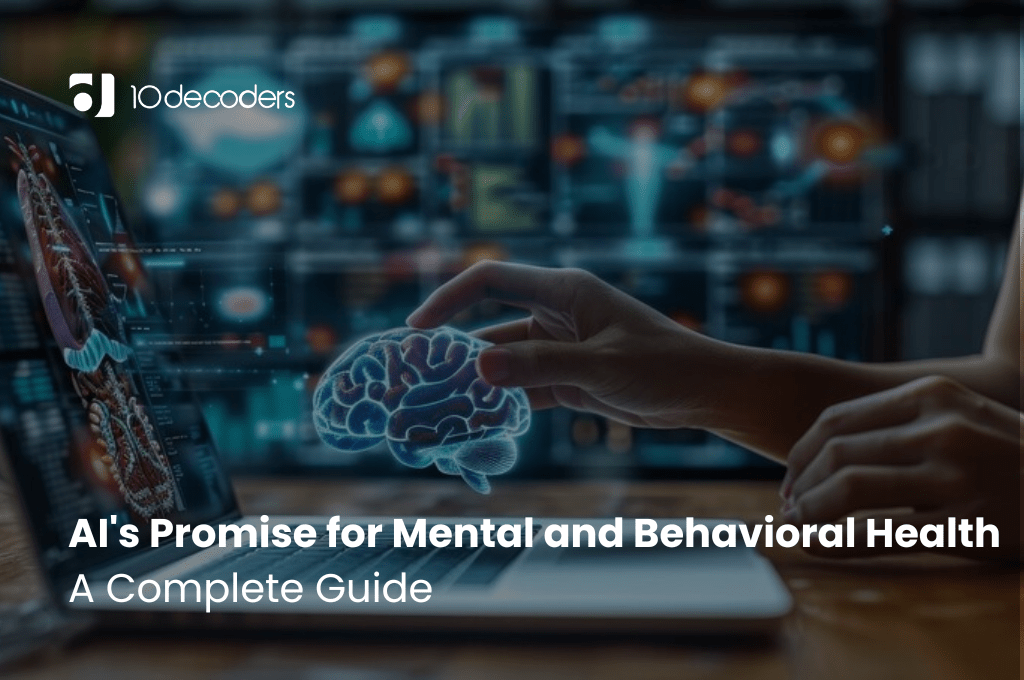AI's Promise for Mental and Behavioral Health- A Complete Guide
Introduction
Over the past few years, the United States has faced a significant crisis concerning mental and behavioral health, characterized by numerous obstacles such as restricted access to treatment and widespread social stigma. Amidst these challenges, the emergence of artificial intelligence (AI) offers a glimmer of hope for transforming the landscape of mental healthcare. This article delves into the potential role of AI in addressing mental and behavioral health issues, exploring current applications, benefits, and the importance of an up-to-date system for successful implementation.
Understanding the Potential of AI in Mental and Behavioral Health
Artificial intelligence offers a multitude of applications in mental and behavioral health, ranging from diagnosis to treatment planning and patient support. By harnessing advanced technologies like machine learning and natural language processing, AI has the potential to enhance clinical practice and patient outcomes.
Diagnosis and Risk Assessment
AI algorithms can analyze extensive datasets, including electronic health records and behavioral patterns, to aid in diagnosing mental health conditions and assessing the risk of developing disorders. By comparing multiple data points against established criteria, AI-driven diagnostic systems can offer more accurate and efficient diagnoses.
Therapy and Self-Assessment
AI-powered chatbots and virtual therapists provide accessible and personalized support to individuals with mental health conditions. Leveraging natural language processing and machine learning, these chatbots offer therapy sessions, track user responses, and help manage symptoms, filling gaps in traditional therapy delivery.
Patient Engagement and Accessibility
AI improves patient engagement and accessibility to mental healthcare through seamless communication, appointment scheduling, and health education. Combined with wearable devices, AI-powered tracking tools offer continuous monitoring and support, empowering individuals to take an active role in their mental health journey.
Benefits of AI in Mental Health Treatments
The integration of AI into mental health treatments offers numerous benefits, revolutionizing healthcare delivery and experience. AI-based applications provide cost-effective alternatives to traditional therapy, enhance personalization, and enable early detection and intervention, ultimately improving outcomes and accessibility.
Affordability and Scalability
AI-based mental health applications reduce financial barriers and improve affordability, making mental healthcare more accessible to a wider population. The scalability of AI-driven solutions extends their reach, ensuring that more individuals can benefit from timely interventions.
Personalization and Precision
AI algorithms analyze patient data to create personalized treatment plans, optimizing outcomes with greater precision by considering individual variations in symptoms and treatment response.
Early Detection and Intervention
AI algorithms identify patterns and early warning signs of mental health conditions, enabling timely interventions to prevent the progression of disorders. Early detection improves prognosis and enhances the effectiveness of interventions.
The Importance of an Up-to-Date System for Successful Implementation
To fully realize the potential of AI in mental and behavioral health, an up-to-date system is essential, considering ethical, legal, and technical considerations.
Diverse and Unbiased Data
AI systems require training on diverse and unbiased datasets to ensure fair and accurate predictions, avoiding the perpetuation of biases. Incorporating a wide range of data sources enhances the reliability and inclusivity of AI-driven solutions.
Ethical and Legal Frameworks
An up-to-date system must adhere to ethical and legal frameworks to protect patient privacy and ensure responsible use of AI in mental healthcare. Clear guidelines and regulations address ethical concerns and promote the ethical implementation of AI technologies.
Collaborative Approach
Collaboration among stakeholders is crucial for developing comprehensive guidelines and regulations for the responsible integration of AI in mental healthcare. Interdisciplinary collaboration harnesses diverse perspectives and expertise to ensure successful implementation.
The Future Prospect of AI in Mental Health
While the future application of AI in mental health is promising, ongoing research and analysis are necessary to refine and evaluate AI-driven interventions continuously.
Research and Analysis
AI aids researchers in uncovering patterns and gaining insights into the development, spread, and prevention of mental health illnesses, informing more effective interventions.
Improved Study Quality
Rigorous research and evaluation are essential to determine the effectiveness of AI-powered interventions. Higher quality studies provide a clearer understanding of the benefits and limitations of these technologies, enabling continuous improvement and refinement.
Building Evidence-Based Programs
A robust evidence base is necessary for the development of AI-driven interventions. Conducting a series of studies ensures empirical evidence guides program enhancements, leading to the development of evidence-based interventions.
Continuous Development and Adaptation
AI in mental health is an evolving field that requires ongoing development and adaptation. Incorporating new models and techniques ensures that AI remains relevant and effective in addressing the changing landscape of mental health and technology.
Last words
Artificial intelligence offers immense promise in revolutionizing mental and behavioral healthcare by enhancing accessibility, affordability, and efficiency. To realize this potential, it is essential to understand the state of mental health, embrace AI technologies, and adopt an up-to-date system that addresses ethical, legal, and technical considerations. Through collaborative efforts and ongoing research, AI has the power to transform mental healthcare, offering hope to millions worldwide.



